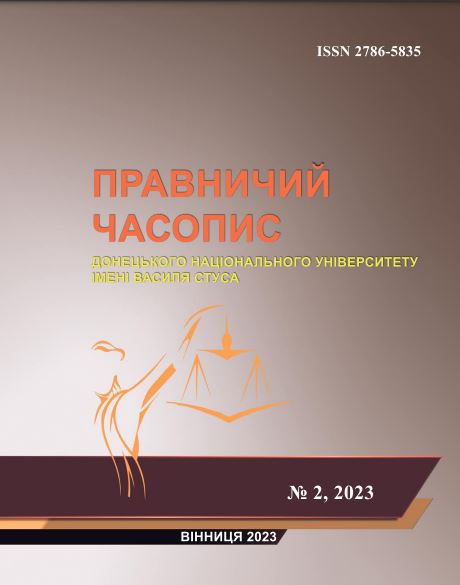Legal regulation of establishing that an employee is not suitable for the position to which he or she was hired or for the work performed during the probationary period
DOI:
https://doi.org/10.31558/2786-5835.2023.2.20Keywords:
suitability of an employee for the position held; probationary period; business evaluation; prohibition of discrimination; probation; employee; employer; employment contract; employment relations; legal regulationAbstract
The study outlines the advantages of testing during hiring and identifies problematic points that arise in the process of testing and establishing the employee’s ineligibility. In the course of the conducted research, the legal regulation of establishing the inadequacy of the employee to the position held or the work performed during the trial period as a basis for terminating the employment contract at the initiative of the employer was carefully analysed.
The peculiarities of the procedure for establishing, conducting and determining the results of the test in accordance with the Code of Labor Laws of Ukraine and the newly adopted in connection with the introduction of martial law by the Law of Ukraine «On the organization of labor relations under martial law» were considered. Emphasis is placed on the changes that labor legislation has undergone as a result of martial law and directly on the provisions of Part 3 of Article 26 of the Labor Code of Ukraine, which refers to restrictions on the establishment of probation for certain categories of persons. The problem related to restrictions on the establishment of probation for certain categories of persons who do not operate during martial law is highlighted, and the question of the need to establish such restrictions on all the listed categories under normal conditions is emphasized. The problems related to the payment of wages to the employee during the probationary period are noted and the position of the Supreme Court on this issue is emphasized. It is proposed to make additions to the Code of Labor Laws of Ukraine, which defines the obligation of employers to provide clear and objective criteria for testing employees when hiring. This addition addresses the issues of insufficient standardization and subjectivity in the testing process, contributing to a fair and efficient employer selection process.
The position of the Supreme Court regarding the conditions for the legality of dismissal based on paragraph 11 of Article 40 of the Labor Code of Ukraine, taking into account the second part of Article 28 of the Labor Code of Ukraine, was also emphasized. It is emphasized separately that it is worth developing a clear process of evaluating the employee during the probationary period. A list of guarantees for the probationary employee that protects him from the arbitrariness of the employer is proposed and should be enshrined in legislation.
References
Кодекс законів про працю України від 10.12.1971 р. № 322–VIII. URL: https://zakon.rada. gov.ua/laws/show/322-08#Text
Ждан М. Д. Щодо проблем правового регулювання випробування при прийнятті на роботу. Збірник наукових праць Харківського національного педагогічного університету ім. Г. Сковороди. Серія «Право». 2014. Вип. 22. С. 73–83.
Постанова Верховного Суду України від 11 грудня 2019 року у справі № 374/274/18-ц. URL: http://iplex.com.ua/doc.php?regnum=86333485&red=100003b7237263194b378625841 40d9790f966&d=5
Краєвська Є. Чи може бути неоплачуваним випробувальний термін? Юридична газета online. 09 лютого 2021 року. URL: https://yur-gazeta.com/golovna/chi-mozhe-buti-neoplachuvanim-viprobuvalniy-termin.html
Денисевич А. Ю. Правове регулювання оцінки професійного рівня працівників: дис. … канд. юрид. наук: 12.00.05. Київ: 2018. 215 с. URL: https://scc.knu.ua/upload/iblock/3c9/ dis_Denysevych%20A.Y..pdf
Занфірова Т. А. Свобода праці в трудовому праві України: дис. … д-ра юрид. наук: 12.00.05. Київ, 2017. 499 с. URL: https://openarchive.nure.ua/server/api/core/bitstreams/ 470b0f90-d17f-4c0e-90df-69ab9f7c3931/content
Кисельова О. І. Трудове право України: навчальний посібник. Сумський державний університет, 2017. 309 c.

